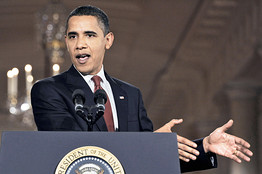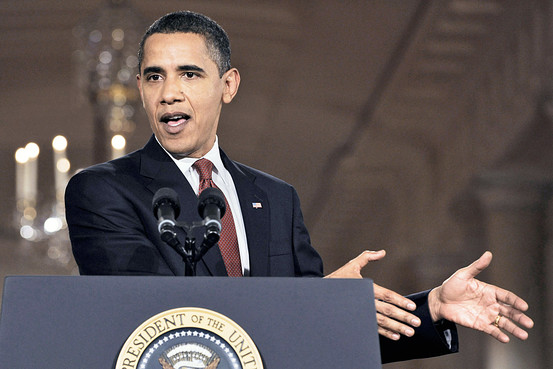By DEBORAH SOLOMON and DAMIAN PALETTA
WASHINGTON -- Many U.S. banks will be subjected to rigorous examinations to see if they are healthy enough to lend before receiving additional financial aid, according to people familiar with the matter.
The stress tests will be part of the bailout revamp to be announced Tuesday by Treasury Secretary Timothy Geithner. In addition to fresh capital injections into banks, the new approach will include programs to help struggling homeowners; a significant expansion of a Federal Reserve program designed to jump-start consumer lending; and a private-public partnership to relieve banks of bad assets.
Mr. Geithner is expected to present the moves as a multi-pronged effort to encourage financial institutions to lend again. The administration's goal is to unfreeze dysfunctional credit markets that have dragged the economy into a recession. He will also announce new conditions on banks receiving aid, including documenting how the money is helping to generate new loans.
The expanded effort could see as much as $2 trillion in financing flowing through the system, according to Congressional officials briefed Monday night. The expanded Fed facility and the "bad bank" could each reach $1 trillion in size, both of which would be seeded with bailout funds.
The administration is discussing spending between $100 billion and $200 billion investing new funds in banks, up to $100 billion to expand the Federal Reserve facility and $50 billion to help homeowners. The Treasury wants to keep some money available in case of emergencies. These commitments could eat up much of the second half of the $700 billion bailout fund.
The Obama administration's initial attempt to sell the plan got off to a rocky start on Capitol Hill Monday evening in briefings with House and Senate staffers. Officials told packed meetings Mr. Geithner would lay out a framework Tuesday for the financial rescue. But a lack of detail was met with skepticism as staffers pressed for more information.
Rep. Brad Sherman (D., Calif.) asked officials how much taxpayers could be on the hook if the situation in the financial system was to further erode. "I appreciate your filibuster, but that's the other side of the Capitol," Mr. Sherman told the Obama officials, according to a person at the briefing.
In a press conference Monday night, President Obama said: "We don't know whether we need additional money or how much we need, until we see how successful we are in restoring confidence."
In an attempt to cast the program in a new light, the administration is renaming the Troubled Asset Relief Program the Financial Stability Plan. The program will remain a part of Treasury but may eventually be separated.
One of the biggest criticisms of the bailout is that banks receiving aid have sat on the funds instead of loaning them to businesses and consumers. The new bank examinations are designed to ensure that banks that are in need of money but still healthy enough to lend, receive cash. The examinations will be mandatory for banks with assets exceeding $100 billion
News, photos and background on key players and issues in the Obama administration's first 100 days from the WSJ and across the Web.
The move could address disagreements between bank regulators about the viability of scores of institutions. Regulators have struggled to come up with a common set of criteria for deciding which banks should receive money. Setting up a stress test could create a more objective set of standards, which might reveal the depths of the industry's problems.
Banks have complained that the process for applying for bailout funds is arbitrary. At least two that applied, National Bank of Commerce in Illinois and County Bank in California, were denied by the government and failed. Research firm RBC Capital Markets estimated Monday that more than 1,000 banks could fail in the next three to five years, more than triple its previous estimates.
Mr. Geithner will also unveil a host of new conditions for banks that receive government aid, including requiring that firms show how the money is being spent and how funds are helping to generate new lending. Banks must show how many new loans they provided with the assistance and how many assets they purchased. They must also agree to implement foreclosure mitigation programs, curb executive pay and not use the funds to purchase healthy banks until the government money is repaid.
The administration is still finalizing details of its a housing plan -- which centers on financial incentives for mortgage companies to modify bad loans -- and may not get into specifics Tuesday. It is expected to express support for a legislative proposal that would allow judges to alter the terms of troubled mortgages in bankruptcy court, but only if borrowers tried to have their loans modified.
Another leg of the revamp, a "bad bank" that would buy up toxic assets fouling the financial system, received a cautious welcome on Wall Street. The administration, hoping to avoid spending large sums of taxpayer money, wants the private sector to largely fund the effort. To entice investor participation, the government would limit the risk associated with buying the assets.
—Michael R. Crittenden, Peter Lattman, Scott Patterson and Craig Karmin contributed to this article.Write to Deborah Solomon at deborah.solomon@wsj.com and Damian Paletta at damian.paletta@wsj.com
Printed in The Wall Street Journal, page A3

![[Timothy Geithner]](https://cybercemetery.unt.edu/archive/cop/20110402232948im_/http://sg.wsj.net/public/resources/images/HC-GN264_Geithn_BV_20090113150057.gif)






![[gascover1]](https://cybercemetery.unt.edu/archive/cop/20110402232948im_/http://si.wsj.net/public/resources/images/OB-NI994_gascov_C_20110401184323.jpg)
![[Car1]](https://cybercemetery.unt.edu/archive/cop/20110402232948im_/http://si.wsj.net/public/resources/images/OD-AF476_Car1_C_20110401011028.jpg)
![[OB-NJ130_gomez1_C_20110402143726.jpg]](https://cybercemetery.unt.edu/archive/cop/20110402232948im_/http://si.wsj.net/public/resources/images/OB-NJ130_gomez1_C_20110402143726.jpg)
![[COBRA]](https://cybercemetery.unt.edu/archive/cop/20110402232948im_/http://si.wsj.net/public/resources/images/NY-AW294_COBRA_C_20110401222208.jpg)
![[jumpropes1]](https://cybercemetery.unt.edu/archive/cop/20110402232948im_/http://si.wsj.net/public/resources/images/OB-NI754_jumpro_C_20110401123242.jpg)
![[NYSCENE6]](https://cybercemetery.unt.edu/archive/cop/20110402232948im_/http://si.wsj.net/public/resources/images/NY-AW330_NYSCEN_C_20110401181946.jpg)





Most Recommended
“"[Working class whites]...;”
“The plan of the left, as so...;”
“A model for the failure of...;”
“One congressman bucking the...;”
“Exactly like the Mafia, unions...;”